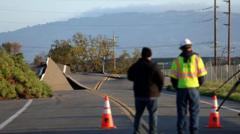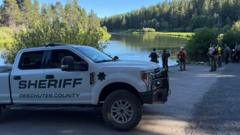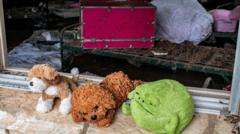The National Oceanic and Atmospheric Administration warns that a developing 'bomb cyclone' off the Pacific coast could lead to severe weather conditions, including flooding and blizzard-like snow, affecting over seven million residents in the region.
"Northwest US Faces Major Weather Threat from Rare 'Bomb Cyclone'"

"Northwest US Faces Major Weather Threat from Rare 'Bomb Cyclone'"
A potent storm system is expected to deliver intense rain, wind, and snow across the US Northwest, impacting millions this week.
A formidable storm system, dubbed a "bomb cyclone," is poised to strike the US Northwest, bringing unprecedented weather conditions that could affect more than seven million residents in coastal states. Starting its impact on Tuesday, the National Oceanic and Atmospheric Administration (NOAA) anticipates the storm to intensify through the week.
This severe weather event is driven by rapidly decreasing air pressure off the coast, which has led to significant intensification of the system. Areas like Seattle are already experiencing strong wind gusts, while heavier rainfall and mountain snow are expected to follow suit. NOAA predicts accumulation rates of 2-3 inches (approximately 5-8 centimeters) of snow per hour, with peak wind speeds reaching 65 mph (around 29 meters per second). Travel will likely be severely disrupted as whiteout conditions emerge, particularly in higher elevations where snowfall could reach between 10 and 20 inches (25-50 centimeters).
Regions of northern California and southwest Oregon are under immense threat of flash flooding, with warnings of mudslides and power outages due to downed trees and high surf along the coastline. To prepare for these extreme conditions, the National Weather Service has already issued winter weather alerts and storm warnings for various coastal areas.
A "bomb cyclone" is defined by meteorologists as a storm that rapidly intensifies with a central air pressure drop of at least 24 millibars within 24 hours. This phenomenon is characterized by its explosive potential, leading to a wide range of severe weather effects, including blizzards and heavy thunderstorms.
Forecaster Helen Rossington from BBC Weather has noted that the initial phase of the storm will be marked by fierce winds and precipitation, which will evolve into prolonged periods of torrential rain and snowfall, further increasing the flood risk.
Such bomb cyclone events, while rare, can happen alongside atmospheric rivers—narrow bands of moisture that travel from tropical regions—which recently have also been affecting North America. However, the combination of these two weather patterns can result in dramatically increased weather threats. Residents and authorities in impacted areas are advised to stay informed and be prepared for the worst as the storm unfolds.






















